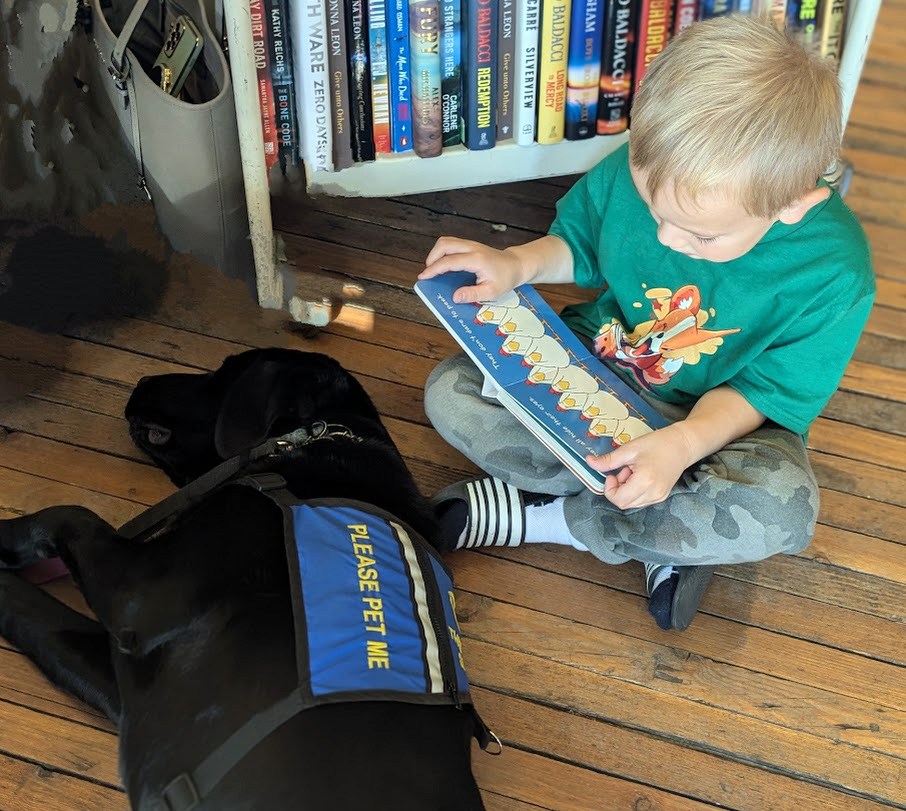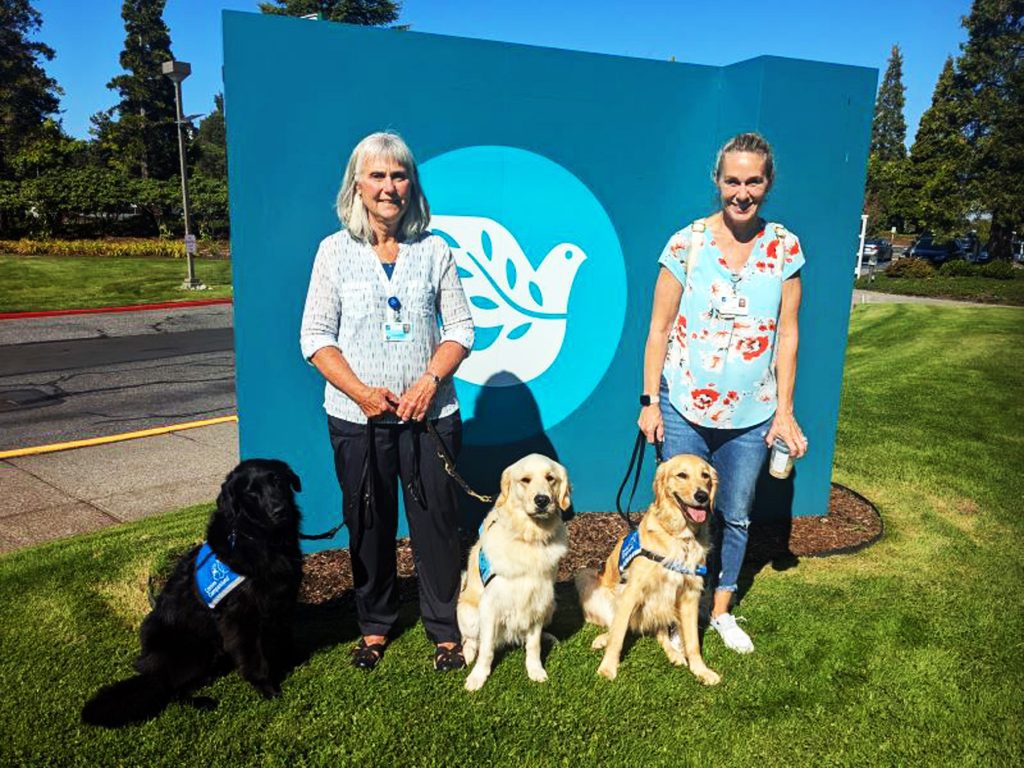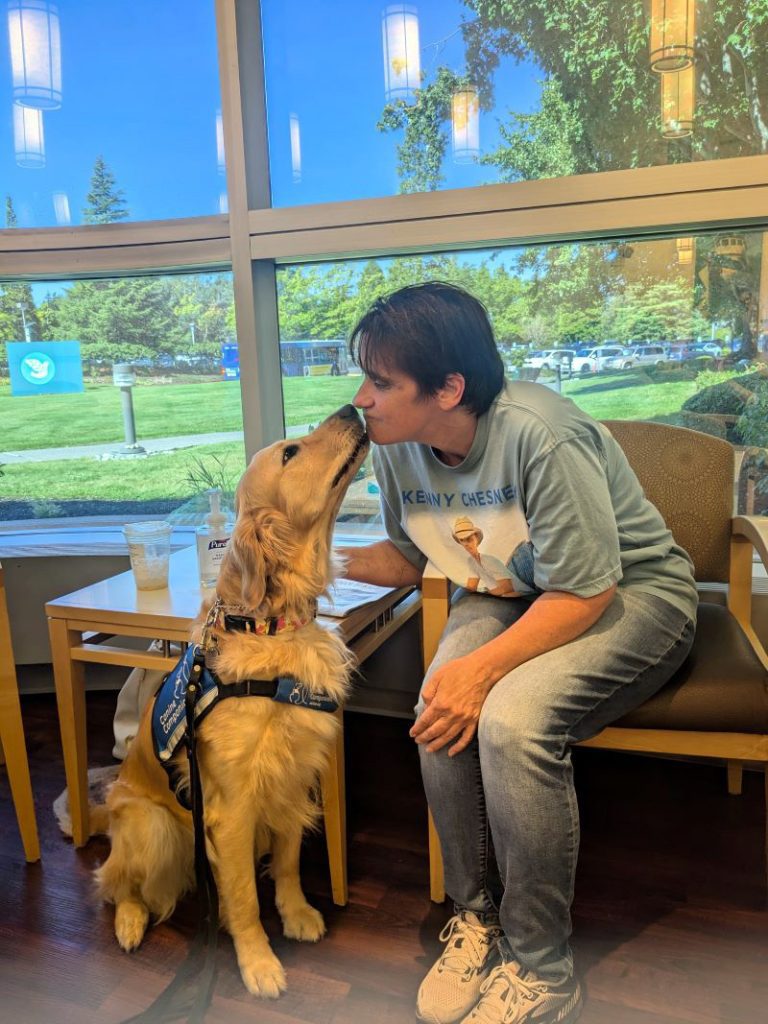The surest way to bring a smile to your life might just be watching kids read to dogs…and when Simon, a fluffy Golden Doodle, earnestly looks at the page of the book held in front of him, that’s just icing on the cake.
This was the recent scene at Village Books/Lynden where Whatcom Therapy Dogs (WTD) humans and their pups show up monthly for story time, organized by WTD’s Kelly Snoek. Kids, usually ages 2–10, gather around and for the first minutes there is a rush of tail wagging, kisses, hugs around doggie necks, and happy screeches. Then store manager, Troy Luginbill, encourages the young crowd to choose a book from the children’s section of the store; the kids seem to take it in stride that they will be reading to the dogs. The adults present seem, well, thrilled.
And why not! Dogs are non-judgmental and make the perfect listener for a child who may be just learning to sound out words or who needs the special encouragement and confidence a loving dog provides.
Whatcom Therapy Dogs
There’s a difference between therapy dogs, service dogs and facility dogs, and specific training for each. The sweet dogs who show up to be read to — Abbey, Nugget, Shadow, and Simon — and their humans are all registered teams with Whatcom Therapy Dogs.
According to Whatcom Therapy Dogs Co-Director Chris Monroe, these are dogs who are good an interactive setting and “have the personality to be a friend to someone who needs a little extra loving and reassurance.”

Once a dog is evaluated and approved as able to mind their manners, willing to engage with people, outgoing, and — another big factor — able to get along well with other dogs, owner and dog undertake specific training. WTD Co-Director Kathleen Laughlin runs a therapy dog prep class twice a year — the next one is in mid-March — for people interested in becoming a therapy dog team. Classes are small, so if you think your dog might be a good candidate, check it out now. Then, to work in most settings, therapy dogs must be evaluated and certified through a therapy dog organization like Pet Partner.
Whatcom Therapy Dogs networks with organizations in the community who call to ask if teams are available for specific events. In addition to Village Books, they frequent Western Washington University, especially during exam weeks, and at Whatcom Community College. Hospice programs and assisted living facilities are also welcome hosts to visiting dogs.
The owners are committed to the good their dogs are doing. “I didn’t just want a pet,” says Connie, owner of 4-year-old soft-as-a-feather Australian Labradoodle Nugget. “I wanted a dog who made people smile.”
That is exactly what’s going on when Scarlet, William, and Catherine — 7, 5 and 2 years old — visiting from Georgia for a Lynden family wedding, plunked down at Village Books to read to Nugget and 4-year-old Shadow, a black lab who has nap time down to a science.

Pups Visit PeaceHealth
The entry area of PeaceHealth hospital is busy in a different way than Village Books. The atmosphere noticeably calmed as soon as Lili, Kuni, and Metcalf entered the space. The dogs are owned and trained by Canine Companions, a national nonprofit that provides service dogs to adults and children with disabilities, and facility dogs to professionals working not only in healthcare but also in the criminal justice system, and education. There is never a cost for the dogs and all follow-up services to clients during the working life of the dog.
The facility and therapy dogs live with their certified handlers and are specifically trained for visits to places like hospitals and senior centers. They differ from service dogs who are trained to live and work exclusively with one person.

Claudia Peters, now-retired PeaceHealth St. Joseph’s Medical Center physical therapist, and handler of facility dog Metcalf and therapy dog Kuni, was instrumental in starting the pet therapy program there. She raised service dog puppies for 25 years through Canine Companions. PeaceHealth’s program got its start in 1997. According to PeaceHealth Communications Specialist Barbara Pongracz Lamb, “this program has brought smiles and comfort to many patients and school kids throughout the Northwest corner.”
Claudia, along with 3-year-old Kuni and 7-year-old Metcalf, were soon joined by Kim Blatz and her 2-year-old facility dog Lili. Just their presence in the area brought smiles to passers-by. Happy stories abound and no only patients benefit. Megan, who works in Central Supply at PeaceHealth, looks forward to the dogs’ regular Thursday visits. As soon as she sat down, a sweet dog walked over to bestow kisses.
The benefits go beyond snuggling and unconditional love. Peters notes that having a facility dog involved can “reduce pain for patients, give them a motivation to get up, normalize the situation, and even shorten their stay in the hospital.”

That kind of comfort was important during the major community vaccination program administered by PeaceHealth during Covid. Dogs could be found bringing their special brand of comfort to people in the vaccine clinics and outside for the weary staff, so stalwart throughout the pandemic.
Seems like reading to a dog on a Saturday morning is the least we can do for these caring, gentle companions.












































